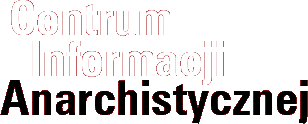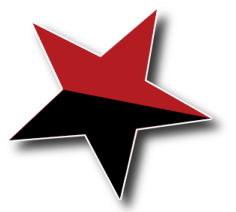Killer Coke: korporacja komentuje i kłamie
 Dziś firma Coca Cola opublikowała oświadczenie dotyczące bojkotu Coca Coli w Polsce. Firma twierdzi, że:
Dziś firma Coca Cola opublikowała oświadczenie dotyczące bojkotu Coca Coli w Polsce. Firma twierdzi, że:
-"wszelkie działania koncernu są zgodne z prawem"
- "w Polsce Coca-Cola cieszy się niesłabnącą reputacją dobrego pracodawcy"
- "nasi koledzy ... zrobili wszystko, aby wyjaśnić te nieprawdziwe zarzuty"
- "W zakresie ochrony środowiska the Coca-Cola Company i jej rozlewnie stosują najbardziej rygorystyczne zasady i procedury działania."
- "pracownicy zakładów Coca-Cola w Kolumbii cieszą się wolnością zgromadzeń, prawem do zawierania układów zbiorowych i negocjacji poprzez przedstawicieli związkowych oraz atmosferą pracy wolną od antyzwiązkowych niepokojów"
Publikujemy oświadczenie poniżej. Prosimy czytelników o komentarze.
Oświadczenie w sprawie akcji protestacyjnej organizacji CK-LA przeciw the Coca-Cola Company
The Coca-Cola Company to firma o ponad 120 letniej tradycji i uznanej reputacji, która posiada swoje oddziały w 200 krajach świata. Wszelkie działania koncernu są zgodne z prawem oraz uwzględniają interesy nie tylko samej firmy, ale także jej pracowników i partnerów. Nasza reputacja jest dla nas bardzo ważna, dlatego wszystkie oskarżenia w stosunku do naszej firmy traktujemy bardzo poważnie. Rozumiemy, że osoby, które podejmują takie działania jak ostatnia akcja CK-LA kierują się chęcią wyjaśnienia kontrowersyjnych spraw ważnych z punktu widzenia praw jednostki. Nam również bardzo zależy na tym, aby wszystkie sytuacje dotyczące naszej firmy zostały wyjaśnione. Dlatego nasi koledzy z krajów, przykład których podaje CK-LA, zrobili wszystko, aby wyjaśnić te nieprawdziwe zarzuty z udziałem niezależnych sądów i innych wiarygodnych instytucji. Jesteśmy gotowi podjąć dialog z przedstawicielami CK-LA w celu przedstawienia im szczegółowych informacji na ten temat (w załączeniu poniżej).
Równocześnie pragniemy podkreślić, że w Polsce Coca-Cola cieszy się niesłabnącą reputacją dobrego pracodawcy. W tym roku po raz drugi środowiska studenckie przyznały nam nagrodę Studenckiego Pracodawcy Roku. Ponadto, prowadzimy szereg działań prospołecznych i charytatywnych, czego przykładem jest wieloletnie partnerstwo strategiczne ze Stowarzyszeniem Olimpiady Specjalne, za co w 2005 r. uzyskaliśmy tytuł Specjalnego Przyjaciela Olimpiad Specjalnych.
W zakresie ochrony środowiska the Coca-Cola Company i jej rozlewnie stosują najbardziej rygorystyczne zasady i procedury działania. Wszystkie zakłady produkcyjne należące do Coca-Cola HBC Polska Sp. z o.o. posiadają certyfikat Systemu Zarządzania Środowiskiem zgodny z międzynarodową normą ISO14001. Firma wypracowała własne mechanizmy zapobiegające zanieczyszczaniu środowiska. W zakładach produkcyjnych w Staniątkach, Radzyminie i Łodzi prowadzone są działania mające na celu segregację i odzysk odpadów technologicznych, papieru, butelek plastikowych, baterii, ochronę gleby przed wyciekiem paliw, odpowiedzialne zarządzanie chemikaliami oraz odzysk wody.
Angażujemy się również w projekty mające na celu zachowanie zasobów wodnych, czego przykładem jest działalność Funduszu Kropli Beskidu w Beskidzie Sądeckim czy sponsorowanie projektu Rzeki dla Życia prowadzonego przez polski oddział światowej organizacji ekologicznej WWF.
Fakty dotyczące sytuacji w Kolumbii, Turcji i Indiach
1. Kolumbia – sprawa działaczy związkowych
· W ciągu minionych dekad Kolumbią targały konflikty wewnętrzne, które dotknęły Kolumbijczyków pochodzących z różnych grup społecznych, w tym liderów związków zawodowych. Pomimo niestabilnej sytuacji Coca-Cola i współpracujące z koncernem rozlewnie utrzymują pracę swoich zakładów, starając się zapewnić pracownikom bezpieczne i stabilne miejsca pracy. W tym celu Coca-Cola wspólnie ze związkami zawodowymi i kolumbijskim rządem, wprowadziła szereg środków bezpieczeństwa, miedzy innymi czynny przez całą dobę telefon alarmowy, transport z pracy i do pracy, ochronę miejsc zamieszkania. Warto dodać, iż przywódcy związków zawodowych, jako osoby szczególnie narażone na niebezpieczeństwo, zostali objęci specjalną ochroną.
· W związku z pomówieniami koncernu Coca-Cola o udział w zabójstwie przywódców kolumbijskich związków zawodowych o nazwie “SINALTRAINBEC”, niezależne podmioty i instytucje przeprowadziły specjalne śledztwa. Także sam “SINALTRAINBEC” wydał oświadczenie, w którym stwierdził jednoznacznie, że brak jest jakichkolwiek dowodów na potwierdzenie tych opinii. Ponadto organizacja wyraziła ubolewanie z powodu pojawienia się głosów o powiązaniach między Coca-Cola a paramilitarnymi grupami, odpowiedzialnymi za akty przemocy wobec ich działaczy.
· Sprawa została rozpatrzona przez Kolumbijską Prokuraturę Generalną (the Colombian Attorney General )oraz Kolumbijski Sąd (Colombian Court), które nie znalazły żadnych dowodów na wspieranie, nakłanianie lub czynny udział The Coca-Cola Company w zastraszeniu i szykanowaniu przedstawicieli kolumbijskich związków zawodowych. Tym samym zarzuty udziału Coca-Cola w zabójstwach związkowców z “SINALTRAINBEC” zostały oddalone. Identyczną decyzję podjął w 2001 roku amerykański sąd w Miami (U.S. District Court in Miami).
· Dodatkowo specjalny audyt w tej sprawie przeprowadziła Cal Safety Compliance Corporation, firma specjalizująca się w badaniach nad społeczną odpowiedzialnością firm w zakresie zapewnienia odpowiednich warunków pracy pracownikom. Jej inspekcja potwierdziła, że pracownicy zakładów Coca-Cola w Kolumbii cieszą się wolnością zgromadzeń, prawem do zawierania układów zbiorowych i negocjacji poprzez przedstawicieli związkowych oraz atmosferą pracy wolną od antyzwiązkowych niepokojów. Warto podkreślić, że 31% pracowników Coca-Cola i jej rozlewów w Kolumbii należy do związków zawodowych, podczas kiedy średnia krajowa takiej przynależności wynosi 4%.
· Coca-Cola prowadzi działalność w Kolumbii od 70 lat. System zatrudnia ponad 2000 osób, a około 500 000 detalistów zaangażowanych jest w dystrybucję isprzedaż produktów koncernu. Od początku swojego istnienia w tym kraju Coca-Cola wspiera projekty i programy społeczne i charytatywne, które pomagają dzieciom, wspierają edukację, czy niosą pomoc ofiarom wewnętrznych konfiktów. W 2006 r. the Coca-Cola Company przekazała kwotę 10 milionów dolarów na stworzenie Kolumbijskiej Fundacji na rzecz Edukacji i Rozwoju (Colombian Foundation for Education and Opportunity) - organizacji, która pomaga ofiarom przemocy i zarządzana jest przez grupę kolumbijskich autorytetów, w tym prezydenta Kolumbijskiej Konfederacji Pracowników (Colombian United Confederation Workers).
2: Turcja – sprawa protestu związków zawodowych
· Sprawa dotyczy zdarzenia, do jakiego doszło w Turcji, kiedy to podczas nielegalnego protestu, organizowanego przez związek zawodowy DISK/Nakliyat, doszło do wtargnięcia i okupacji biura firmy CCI, będącej licencjonowanym producentem napojów Coca-Cola. Protest nie był skierowany przeciwko CCI, ale przeciwko podwykonawcy koncernu, dystrybucyjnej firmie Trakya Nakliyat ve Dagitim.
· Pomimo wielogodzinnych rozmów pomiędzy zarządem firmy CCI, a związkowcami z DISK/Nakliyat, protestujący nie zgodzili się dobrowolnie opuścić budynku. Po 10 godzinach utrzymującego się impasu, Prokurator Generalny Turcji wydał nakaz interwencji policyjnej wobec protestujących. Stało się tak mimo próśb CCI o wstrzymanie akcji i zezwolenie na kontynuowanie rozmów ze związkowcami.
· Coca-Cola wyraziła ubolewanie, że mimo wysiłków ze strony CCI doszło do użycia siły wobec protestujących. Firma żałuje, że nie udało się przekonać protestujących związkowców DISK/Nakliyat do zaprzestania nielegalnej okupacji metodami pokojowymi. Ostatecznie spór zakończył się podpisaniem porozumienia pomiędzy związkiem zawodowym DISK/Nakliyat a firmą Trakya Nakliyat ve Dagitim.
· Mimo powyższego, Międzynarodowa Organizacja Praw Pracowniczych (the International Labor Rights Fund) wniosła sprawę o użycie siły wobec protestujących przeciw The Coca-Cola Company oraz jej tureckiemu partnerowi, firmie CCI w federalnym sądzie okręgu Manhattan (Federal District Court in Manhattan).
3: Indie – sprawa gospodarowania zasobami wody pitnej
· Coca-Cola nie zgadza się z zarzutami o niewłaściwe gospodarowanie zasobami wody w Indiach. W latach 1999 - 2005 zużycie wody w naszych fabrykach w tym kraju zmniejszyło się o jedną trzecią. W rozlewniach w dużym stopniu wykorzystuje się wodę deszczową. Znaczna ilość wody, jaka jest potrzebna do produkcji naszych produktów, jest z powrotem wprowadzana do wód gruntowych w postaci nieszkodliwej dla środowiska. Ponadto firma współpracuje z lokalnymi władzami i społecznościami przy tworzeniu zbiorników wody deszczowej. Do tej pory Coca-Cola sfinansowała i zainstalowała ponad 300 takich obiektów w całych Indiach. Firma współpracowała także przy odbudowie tamy w jednym z najsuchszych rejonów Indii, Andrha Padesh, co zapewniło okolicznej ludności nawadnianie pól i stałą dostawę wody pitnej.
· Coca-Cola zwraca szczególną uwagę na zarządzanie odpadami. Firma ściśle monitoruje w swoich rozlewniach skład chemiczny substancji powstałych
w procesie produkcji. Są one regularnie badane, a ich wywóz jest ściśle kontrolowany. Takie same standardy obowiązywały od początku działalności Coca-Cola w Indiach. Od 2003 r. firma w ogóle nie dystrybuuje rolnikom żadnych substancji dla celów rolniczych. Równocześnie oddział Coca-Cola w Indiach współpracuje z rządem indyjskim i innymi organizacjami nad rozwojem systemu oczyszczalni ścieków i stworzeniem przejrzystej polityki dotyczącej gospodarki odpadami.
· Woda wykorzystywana w produktach the Coca-Cola Company przepuszczana jest przez wielostopniowy system oczyszczania, wykorzystujący m.in. filtry węglowe. Nasze produkty w Indiach są ściśle kontrolowane oraz badane pod względem zawartości pestycydów i odpowiadają kryteriom obowiązującym w Unii Europejskiej. Ponadto Indyjskie Ministerstwo Zdrowia, które we własnym zakresie zbadało produkty Coca-Cola, stwierdziło, że żadne dopuszczalne normy nie zostały przekroczone.
W wyniku spraw wniesionych przeciw firmie sądy w Kerala i Kalkucie uznały, że zarzuty postawione firmie Coca-Cola India nie znalazły potwierdzenia i nakazały odnowienie licencji udzielonej wcześniej rozlewni w Kerala. Tym samym oskarżenia o sprzeczne z prawem działania zakładu w Kerala, przekraczenie norm dotyczących ilości pestycydów w produktach Coca-Cola oraz wyczerpanie zapasów wód gruntowych nie zostały potwierdzone przez indyjski wymiar sprawiedliwości.
Szczegółowe informacje na temat opisanych wyżej spraw można znaleźć na stronie: http://www.cokefacts.com/






